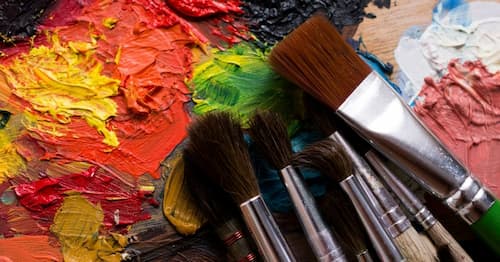
Do you have experience with acrylic paint? Acrylic paint is a very popular type of paint. It's composed of acrylic and cures to a solid, long-lasting finish. Some acrylics can be combined with watercolor or another acrylic to create various effects. This lesson will show you how to use acrylic paint in your arts and crafts projects!
You can also check other Virtual Workshop Singapore for more amazing online activities!
Acrylic Paints are a popular choice among both amateurs and professionals due to their flexibility. They dry swiftly and may be thinned or washed with water, making them excellent for novices!
Student grade acrylic paints are less expensive and less pure than artist-grade paints since they employ lower-cost, less pure pigments rather than the high-quality ones used by experts. They also have more additives and extenders in larger amounts.
Artist grade paints are often heavy in single-color pigments and light on additives or extenders. The more colors you use, the more likely they are to fade, get muddy, and lose luster. Artist paints also accentuate the distinctiveness of each pigment.
The Heavy Body paints are the thickest and heaviest among the other types, with a smooth texture. They're comparable to oil paints when it comes to application and have a mild buttery feel. They take well to harsh surfaces.
The texture of Soft Body paints is smoother and more yogurt-like than other types. This makes them perfect for layering with mediums while yet providing enough thickness to paint freely and rapidly.
Paints that are fluid have a smooth, creamy feel and are wonderful for brush or stain techniques. They're ideal for glazes and very detailed work since they have a beautiful flow to them when used in a bottle.
Acrylic ink is the most liquid type of acrylic paint. It's composed of tiny, super-fine particles suspended in an innovative acrylic emulsion that flows like water. When dry, Acrylic Ink has a glossy sheen and is brightly colored. To make it, simply use an airbrush, pen, or brush to apply it.
Open paints take a long time to dry, making it simple to work wet-into-wet and blend colors on the surface of your artwork. They're ideal for painters who want to use oil techniques that aren't generally accessible.
Interactive Acrylics are artist-quality, fast-drying acrylic that is unique in the 'unlocking formula,' a liquid that rewets dried interactive acrylic and slows drying as few drops are added to wet paint.
Acrylic gouache is a creamy paint with a matte velvety finish. Brush markings are less obvious with this paint, which is typical among artists. If you want to paint an entire area using flat color in one go, try gouache.
Acrylic paint marker pens are markers that may be used to mix painting and drawing styles. Acrylic markers are high-coverage, fast-drying, water-resistant, and fade resistant. They'll stain almost any surface with a brilliant color or paint and will stick to most materials, including metals.
Acrylic spray paint is a versatile paint with a lot of applications. Some acrylic sprays include solvent, so if you apply one that does, keep in mind to use one that includes a fume filter or in an area where there's adequate ventilation. Because water-based paints do not generate hazardous gases, they are safe to use indoors.
Choosing the incorrect tools may have a big influence on the quality of your work. For acrylic painting, you'll need numerous brushes ranging from tiny to huge for various approaches and many different paints, among other things. Make sure you have a stiff-bristled brush when applying thick applications of paint. For water-color effects, such as washing, use a soft-bristled brush. A Filbert paint brush is a good all-purpose tool that comes in either a straight or circular form to accommodate your needs.
To make a “sketch” in paint before you start painting, use a color that goes well with the palette you wish to employ. If you choose an opaque acrylic, any indications of the paint beneath will be hidden.
Acrylic paint palettes are ideal for mixing and matching colors on non-stick surfaces, such as a broad plate or a tray with spaces in it. If you're using thick paints, a wide palette might be more helpful. You may effortlessly apply many hues in big sections with these large-area palettes, for example. If you're working with paint that has a higher viscosity, such as oil paint or acrylics, a palette with wells will be helpful. Using a large flat palette and low-viscosity paint might cause your colors to combine or run off the surface!
This is an excellent approach for novices. Separate each color or tone into its own form, then paint the forms in like you would with a DIY paint-by-numbers piece. This is a simple method that may be used with monochromatic palettes as well as a wide range of colors.
Instead of combining the two hues thoroughly, just mix them with your palette knife for a few seconds. Then use the blended but half-processed colors to create artwork on your canvas. When you apply paint to a blank surface, you'll be astonished at how many distinct tones there are.
Now that you know a bit more about acrylic paints, what are you waiting for? Get to work and create your next masterpiece! Whether you're a novice or an experienced artist, acrylics have something to offer everyone. Perfection is achieved through practice, so keep at it and experiment with new techniques if you want to become a better artist.
You can also check other Virtual Workshop Singapore for more amazing online activities!
If you’re interesting in reading more articles like this, check these out!
